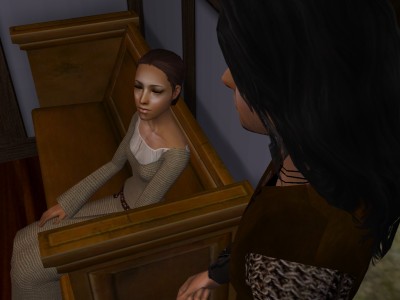
Sir Sigefrith stopped short in the door of his study. Neither his steward nor his ears had deceived him: there was a young lady awaiting him. Alone.
She scrambled out of the bench and curtseyed awkwardly.
“Oh!” Sigefrith grinned in relief as he recognized her. “You’re…”
“Wynflaed,” she said quickly.

“Brid’s daughter.”
“Yes, sir.” She bobbed a slight curtsey again.
Brid Oswaldsson had been one of his tenants, but he had died while Sigefrith was away, and Sigefrith hadn’t yet begun to consider what he meant to do about the situation. Apparently he was about to be called upon to make a decision.
He stepped inside and asked automatically, “Would you like to sit down?”
“Oh—oh—no, thank you.”
He stopped halfway to his chair and turned back to her.

“All right, then. How may I be of service to you?”
He could not guess how old she was. She was a tiny thing to have had so tall a father, but her body was not the body of a little girl.
Although a pleasant man himself, Brid had not been the sort to invite his lord in for a drink, and he had always sent his children running into the house when Sigefrith came to talk. Sigefrith only knew that he had two sons and two daughters, that the daughters were older than the sons, and that his wife was some sort of invalid.
“It’s about Greybeard’s fence,” she blurted.
“Oh…”

“He’s supposed to have mended it since the thaw but he never has and that’s three times now that we’ve found his cows in our fields and every time I ask him to do something about it and he doesn’t and I think it’s because—”
“Wait, wait, slow down,” Sigefrith laughed. “One must be a little patient with me and my slow head.”
“I—beg your pardon.” Her damp cheeks flushed.
“So Greybeard’s cows are getting into your fields? And why do you suppose he doesn’t mend his fence after a lady asked him kindly and his lord ordered him explicitly?”
“Oh—I—don’t know.”

“Weren’t you about to tell me why?”
“Oh—well I…”
She had the tawny skin of a girl who had spent many hours out of doors, and when she blushed her face was neither red nor blotchy like Hilda’s, but merely deepened its color to a warm gold.
Sigefrith gave her what he hoped was an encouraging smile and leaned back against the wall in fatigue. He had been fighting with Brede all morning, with swords, and with Hilda half the night before, with tongues.

The gesture seemed to startle her into understanding. “Oh—are you—?” She blushed a deeper gold and dropped into the bench behind her.
Sigefrith smiled gently and stood straight. “Please don’t sit on my account.”
“But you were standing for mine.”
“I’m too lazy for my own good. But I thank you for your thoughtfulness.” He went to sit. It would be easier for her, he thought, if they had the table between them.

“Now, what you were saying…? Don’t you have a brother?”
“Oh, yes, but he’s only eleven. I don’t think Greybeard would listen to him, either.”
“I would.”
“You would?” she asked, not understanding his meaning.
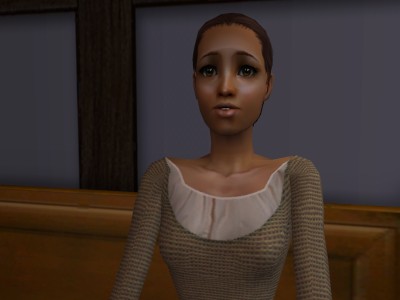
“I… forgive me for pointing it out, but if you brought your brother the next time you come by, or sent him in your place, I could permit myself to close the door.”
She looked over at the door he had left open on her account and blushed nearly to bronze.
“I never thought of that,” she murmured.
“It is to your credit that you did not. I don’t mean to put you ill at ease. I only wonder who is looking out for you now.”
“My little mother is, of course. But we don’t like… we don’t like to trouble her with the matter of Greybeard’s cows.”
“Certainly not. You have an older sister, too, don’t you?”

Sigefrith recalled a taller girl who was bold enough to hang over the fence and watch him ride by—when her father wasn’t around.
“I’m the oldest.”
“You are?” Sigefrith cried.
“My sister is taller than me—” She winced. “Than I.”
“I see. And you are… how old?”
“Seventeen.”

Such a tiny girl was actually a woman! She was no taller than Matilda—and far more slender. Sigefrith realized he was doing a poor job of hiding his amazement. This little creature was in charge of a farm, an invalid mother, and three children? Something had to be done.
“So you see, we’re…” She trailed off in confusion.
“Is there anything I can do for you?” he asked.
“I hope you will ask Greybeard to mend his fence. Sir.”
“I mean, about… is there anything I can do for your family?”
“Oh, no!” she cried. “We’re quite all right.”
“But who…”
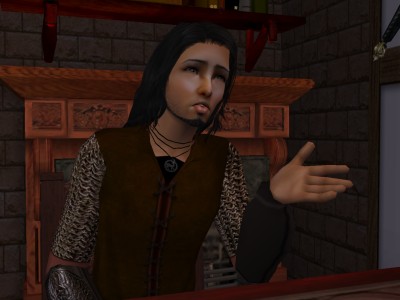
“We have the hands.”
“But don’t you…” This was very awkward. “Have an uncle, or someone?”
“No, sir. But we don’t need anyone.”
She spoke firmly, but her eyes were desperate. He could not quite name their color—neither brown nor green… tarnished bronze perhaps…

And desperate. What did she fear?
“Are you afraid I shall chase you out of there?” he asked bluntly.
She paled beneath her tan. “My brother will soon be a man, sir. And we can manage the farm with my sister and my little mother. Sir.”
“You don’t have anywhere else you wish to go?”

“No, sir. We like it there. My father was very proud of his house and his farm.”
“Of course. But until your brother is of age…”
“No, sir, please.”

Her eyes sparkled with tears. She was terrified of him, or of the power he wielded over her family, and he did not like the feeling. His other tenants were men who could meet him on his own level in that respect, if not in rank, but she was at his mercy in every way. No, he did not like the feeling.
The little thought that he had given to the matter had consisted of wondering whom he could put over the farm until the boy was older, as soon as the widow and her family had gone to live with whatever uncle or cousin would take them in. He had not considered the possibility that they would wish to remain.
It was all the more vexing when one considered the courage it must have required for the little thing to come alone to meet him here—and how she was nevertheless too naïve to have considered how it might appear.
“I apologize for the bluntness of my questions, but I am not a very subtle man,” he said. “What do you and your mother and your sister and your brothers know about managing a farm?”
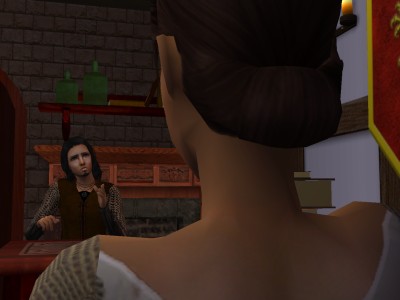
“Everything, sir. My father was ill for a long while, though he was too proud to say it. We have the hands to do the hard work, and I know all about the cows and the milking and managing the house, and my sister tends the goats and poultry, and my brother is very clever about planting and farming, and he can read a little, too.”
“And who can deal with Greybeard?”
She swallowed. He was about to speak to spare her her discomfort, but she said, “I can, sir. If only you tell him that he must listen to me.”

Sigefrith smiled slowly. Her eyes were clear and frank and naïve, and she had the boldness of a child who doesn’t know the danger in what he does. She was at the mercy of the likes of Curran Greybeard.
“I shall tell Greybeard that your word is as law, and if he dislikes your decrees he may seek redress with me. I trust you will be just?”
“Yes, sir,” she said earnestly. “I only wish he would keep his cows out of our field.”
“I am certain that he will invent new trials for you before long, but between the two of us, I think we shall manage to keep him in line.”
A smile finally spread across her face in response to his.
“I shall see Greybeard this afternoon. Is there anything else I may do for you today?”

“No, sir, thank you, sir.” She stood.
Sigefrith rose and walked around his table. “I should have mentioned before that I’m sorry about your father,” he said. “He was a good tenant, and a good man.”
She nodded.
Now that his surprise had passed and he stood before her, he could see just how tiny she was. Those were frail shoulders to carry such a burden as she refused to lay down.
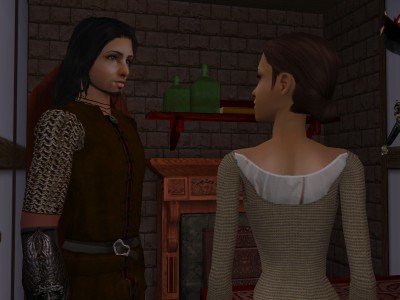
“If your mother is able,” he said, “I should like to stop by for a moment some afternoon. Will you tell her?”
“Yes, sir.” She curtseyed. She too had lost enough of her embarrassment to do it properly this time. “She would be delighted. Sir.”
He smiled slightly in amusement—even his kitchen servants were not so polite—but he supposed he could not encourage nor even permit any greater familiarity between them.
“I shall allow her to name the day. Only send one of your brothers in the morning to advise me.”
“Yes, sir.”

He walked with her to the door and bid her a good day. She was ladylike enough that he nearly bent to kiss her hand, but she, of course, did not think to lift it. Thus he merely bowed.
He had only just closed the door and taken a few slow steps into the room when a timid knock sounded behind him.
“Forget something?” he asked her with a smile.
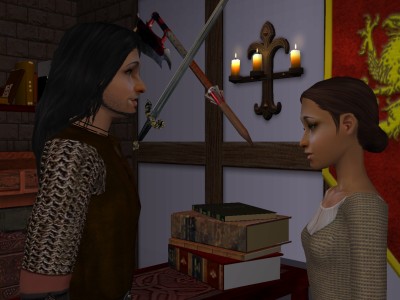
“No, sir,” she said. “I must tell you… I lied.” She hung her head, blushing.
“About…?”
“I’m not truly seventeen. I’m… I shall be sixteen at the end of the month.”
“Oh!” He laughed. He felt inexplicably delighted by this confession, although he supposed it was more by the fact that she felt she had to tell him the truth than by the truth that she told him.
“But I’m just as capable as if I were seventeen,” she said earnestly. “You’ll see!”

“I believe you,” he smiled. “If it makes you feel any better, I must admit that I lied, too.”
“You did?”
“I’m not truly lazy. Only too polite to admit I was tired. Or too ashamed,” he winked.
She smiled sheepishly. “I’m sorry I made you stand. And sorry I let all these flies in,” she said, waving at the few that buzzed about the room.
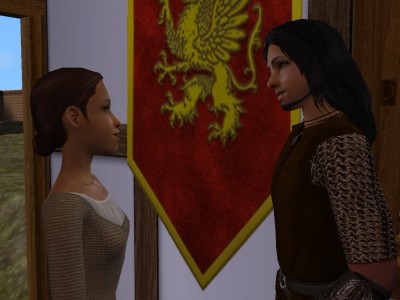
“It was a pleasure,” he said. “Not the flies, but—you know. Come whenever you have troubles, or whenever you like. But next time, bring your brother. I can only guess at how bothersome a little brother may be, but I assume it’s less than the flies.”
“Oh, I wouldn’t say that!” she laughed.
“Well, then!” He laughed with her. “Bring the flies, by all means. At least we may swat the flies!”
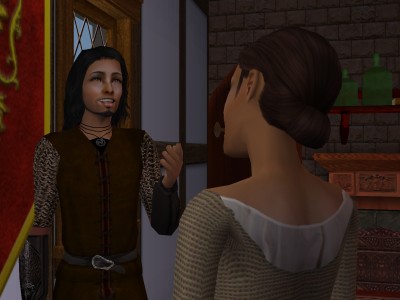






I really want Sigefrith to kick Hilda to the curb and take up with Wynflaed instead. She can't possibly be any more awful than Hilda.